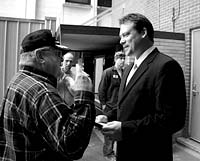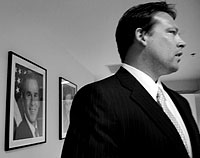When Rep. Heath Shuler was sworn in back in January, it looked as though the neophyte lawmaker was destined to spend some time in the political wilderness. It didn’t help that he was returning to the city where a promising career as an NFL quarterback had quickly turned sour, making Shuler a pariah among rabid Redskins fans. And it didn’t bode well that the conservative, religious Democrat’s party would be led primarily by liberals such as House Speaker Nancy Pelosi. That only reinforced his detractors’ contention that Shuler would face an uphill battle to come anywhere close to wielding the power his predecessor, Charles Taylor, had amassed during 16 years on the Hill.

And then there was Shuler’s assigned space in the historic Cannon House Office Building: on the fifth floor of a structure that’s technically only four stories tall. Visitors must take the elevator to the fourth floor and then hunt up a hidden hallway with a special elevator to the nearly deserted fifth floor. “No one goes up there, and no one ever comes down,” a House staffer who works in a fourth-floor office quipped to The Washington Times.
Yet Shuler has been anything but invisible on Capitol Hill. Besides being featured in several national and international news articles and making coveted appearances on such political TV shows as Fox News Sunday, Shuler has raised his stature by becoming a member of the powerful, conservative-leaning Blue Dog caucus of Democrats. The Blue Dogs have found renewed influence on the Hill thanks to their demonstrated ability to strike a balance between conservative and liberal positions to get legislation passed (a liberal-endorsed minimum wage increase, for example, also contained significant tax breaks for businesses). Shuler also became something of a hero among Democrats by beating a longtime Republican congressman in a conservative-leaning district. As a result, Shuler has found himself conferring with, rather than deferring to, House leaders on the Iraq War, stem-cell-research funding, the budget and other hot-button issues.
Shuler’s surprising political relevance has even extended to quickly and easily—especially for a freshman—snaring committee and subcommittee assignments dealing with transportation, the environment and small business, all key areas for Western North Carolina. The new congressman even chairs the Subcommittee on Rural and Urban Entrepreneurship.
“To get a gavel as a freshman—you’re right, that just doesn’t happen,” Shuler told Xpress by phone from his Washington office. “But I think they realized my leadership [potential] right off the bat.” He got a chance to show it early on, he says, when the Democrats chose Rep. Steny Hoyer as House majority leader over Pelosi’s candidate, Rep. Jack Murtha. Shuler voted for Hoyer, a fellow Blue Dog, but made a point of going to Murtha to tell him why and to pay his respects. Murtha “looked at me and said, ‘Heath, it’s not often—especially coming from a freshman—that someone would come to me and tell me that and be so direct and honest and to the point. Most of the time, I have to hear these things in the papers.’” Shuler cites the episode as a sign “that I think they do have respect [for me].”
Meanwhile, Shuler is also scoring points with some voters back home. “I voted for the guy, but even I’m kind of astonished at the profile he’s been able to build,” noted Asheville resident Brentley Samwell, a political junkie who also spent time lobbying for nonprofit organizations in the 1990s. “I wish [Shuler] were more liberal on issues such as the war and stem-cell research, guns and abortion, but he really seems to care about the environment, the local Cherokees, and a lot of the issues that local progressives really care about. And even though he’s a millionaire, I’ve come to believe he does care about working families and the poor. For me, he’s not perfect, but he does seem to be doing a good job of listening and representing his entire district, not just those who voted for him. And I admire the fact that he stood up for labor by supporting that recent union bill. That took guts in this state—just like it took guts to vote against funding [embryonic] stem-cell research when I really, really wish he hadn’t done that. To an unabashed liberal like me, he’s certainly not perfect, but he’s pretty damn good so far.”

And while Karl Rove and the National Republican Congressional Committee have targeted the first-term representative for defeat in 2008, even some local Republican voters grudgingly agree that Shuler has performed better than expected. “I might could be persuaded to vote for him next time,” said one local Republican who declined to give his name. “As long as he doesn’t become Pelosi’s lap dog, I can see him surviving for a while. But he’d better watch out: He might be more conservative than most Democrats, but as long as he has that capital D after his name, there’s going to be plenty around here who won’t be satisfied until he’s run out of town.”
Middle of the road
For his part, Shuler sees himself and his fellow Blue Dogs acting as a counterweight to both parties’ political extremists, who too often focus on ideology at the expense of getting the nation’s business done. On the House floor, the Blue Dogs quite literally seat themselves along the aisle separating the two parties.
At the same time, Shuler says he’s been surprised at how many truly hard-working, dedicated lawmakers he’s surrounded by, adding that he’s cultivated friendships in both parties. “There’s not only some good people, there’s some great people here on both sides of the aisle,” he notes.
Relationships are vital in Washington, of course, but in assessing his first 100 days on the job, Shuler stresses his work ethic. “I think it’s about being true to yourself, going with your convictions and working as hard as you possibly can to get the work for the people of our district and our country accomplished,” he says. “You can do as little up here as you would like to do, or as much. I’m thankful I have a great staff, because we’ve chosen to … do as much as we possibly can. Our hours here are almost endless, it seems like. We work extremely hard on every issue. … Our light is the first on in the morning and the last to go out at night.”
Some of that hard work, he notes, has to do with balancing the interests of a politically diverse constituency. “We have debates within our own members on our staff to be able to understand and hear both sides,” says Shuler. And so far, the Democratic-controlled Congress has been able to forge bipartisan consensus on several issues. “You’re getting progressives, Blue Dogs and Republicans all working together. I don’t see any tension whatsoever in the House,” he says.
Forging consensus back home among the 11th District’s active conservative and liberal factions is trickier, however. But while the congressman says he aims to represent all his constituents, he also emphasizes that there are some areas where he means to stand firm.
While Shuler’s pro-life stance led him to vote against stem-cell funding, which pleased his conservative constituents, he took political hits on his vote for a recent Iraq War funding bill that, among other things, would set a time line for U.S. troop withdrawal. (At press time, Democratic leaders in the House and Senate leaders were in the process of reconciling the two versions, but President Bush has vowed to veto the final bill and may have enough votes to make it stick.)
To date, Shuler has probably taken the most lumps for supporting—and co-sponsoring—a landmark union-organizing reform package that set conservatives and union foes on fire and has also sparked a presidential veto threat. Nonetheless—and despite North Carolina’s status as the least-unionized state in the nation and long history of anti-union sentiment—Shuler said he won’t back down on the issue. His dad was a member of the postal employees’ union, and Shuler himself belonged to the player’s union in his NFL days. A radio ad campaign painting that vote as political suicide doesn’t scare him, says Shuler.
“The only people that’s going to be nervous having unions are people who don’t treat their employees fairly,” he says with some fire in his voice.
Shuler also lists other no-compromise issues: creating energy independence via cleaner and alternative fuels, and protecting the region’s natural assets such as national-forest lands, some of which President Bush would like to sell off.
If Shuler has a goal for his first term, he says, it would be to resolve the long-running North Shore Road controversy. The so-called “road to nowhere” would cost $600 million and slice through a portion of the Great Smoky Mountains National Park in Swain County, where Shuler was born and raised. Calling the project unnecessary and environmentally insensitive, Shuler is pushing a cash settlement for the county instead.
“It has been an ongoing issue for the past 60 years in my home county,” he says. “I’ve seen it divide a county I have the utmost pride for, and I see it’s an environmental impact. We don’t need to borrow $600 million from China to build a road through the most beautiful place in the world I know of today. That is not using our tax dollars wisely; that is not being good stewards of our lands. And I think we need to get a resolution to this and get it off the table.”


Before you comment
The comments section is here to provide a platform for civil dialogue on the issues we face together as a local community. Xpress is committed to offering this platform for all voices, but when the tone of the discussion gets nasty or strays off topic, we believe many people choose not to participate. Xpress editors are determined to moderate comments to ensure a constructive interchange is maintained. All comments judged not to be in keeping with the spirit of civil discourse will be removed and repeat violators will be banned. See here for our terms of service. Thank you for being part of this effort to promote respectful discussion.